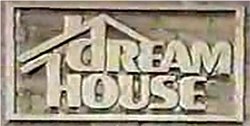Main Game
Two teams of two (usually married couples), one of them a returning champion, competed to win a house worth approximately $100,000.
The host read a true/false toss-up question open to all four players. A correct answer awarded that couple $50 and their choice of four categories, while a miss gave the money and control to their opponents. Each category had a multiple-choice question with three possible answers. After the couple in control gave their answer, the opponents had the option to challenge and select a different one. The couple with the right answer won $100, or $150 in the event of an unsuccessful challenge. Each team could challenge twice during the round. Once a category had been played, it was removed from the board and a new toss-up was asked. The round continued until all four categories had been used.
The game was played in two rounds, with the leader after the first round winning a prize. The second round was played the same as round one, except that each team had a one-time option to double the value of any question for which they had earned control. The option had to be used after the question was asked, but before the answer choices were revealed. The couple leading after two rounds won the game, received a room of furniture, and advanced to the bonus round. Couples kept whatever they earned, win or lose. If the game ended in a tie, one more true/false toss-up question was played to break the tie.
During the show's 15-month NBC run, special weeks were set aside for siblings, single couples with children and engaged couples. There was also a week in November 1983 where the cast of Diff'rent Strokes played for a designated couple, as well as one from May 1984 in which two different celebrity teams played for charity each day.
Rule changes
Several rule changes went into effect in April 1984. The couple in control was required to hit their plunger to determine the question value displayed on a "money machine", a random light which stopped at $50, $100, or $150, and the question had only two answer choices rather than three. The value could also be accompanied with "Prize," which awarded a bonus prize to the team that answered correctly, or "Turnover," which gave control of the question to the opposing team. In the second round, a "Number Off" space was added to the machine, which allowed the team who answered correctly to remove one extra number from the combination lock if they reached the bonus round. Any team that won the game by a margin of $1,000 or more received a car, while a margin of $500 to $950 awarded a prize (later changed to a $500 bonus). Unlike the first format, the winners of round one did not receive a prize, and there was no double option available in round two.
Bonus round
In the bonus round, the couple tried to open a set of "Golden Doors" by programming the correct three-digit combination into an electronic lock that secured them. The lock displayed three rows of four digits each, and the correct combination consisted of one digit from each row. The couple was given an opportunity to remove incorrect digits before making their guess.
Originally, each day that a couple reached the bonus round, one incorrect digit was automatically removed from the lock, following the sequence of top-middle-bottom. A later rule change removed one digit for each time the couple returned, thus depriving them of having one eliminated on their first day. Once the Money Machine format was introduced into the main game, the couple could have one extra digit removed if they had correctly answered a "Number Off" question.
After the initial removal of digits, the couple chose one of three categories and answered three questions in it, each with two possible answers. Each correct response eliminated one more digit – from the top row for the first question, the middle row for the second, the bottom row for the third.
After the questions, the couple entered their guess at the combination. Once a digit was chosen, it could not be changed. After making their guess, the couple pressed a button referred to as a "time release bar," which caused a series of four lights built into the frame of the Golden Doors to activate from the bottom up. If the combination was correct, all the lights came on, the Golden Doors opened, and the couple won the house. If not, the topmost section remained dark, a buzzer sounded, and the host revealed the correct combination.
Champions returned to face the Golden Doors each day until they either programmed the winning combination, won enough games to automatically win the house, or were defeated by another couple. Seven victories were initially required to win the house; this threshold was later lowered to five, then raised to six. When a couple was one victory away from winning the house, a plunger alternately called a "Golden Circuit Breaker" and a "Hotline Switch" was brought out at the beginning of the second round. If the couple won, the plunger was pushed and the Golden Doors automatically opened.
Any couple that won the house — either by guessing the combination or by winning the requisite number of games — retired undefeated, and two new couples competed on the next show.
